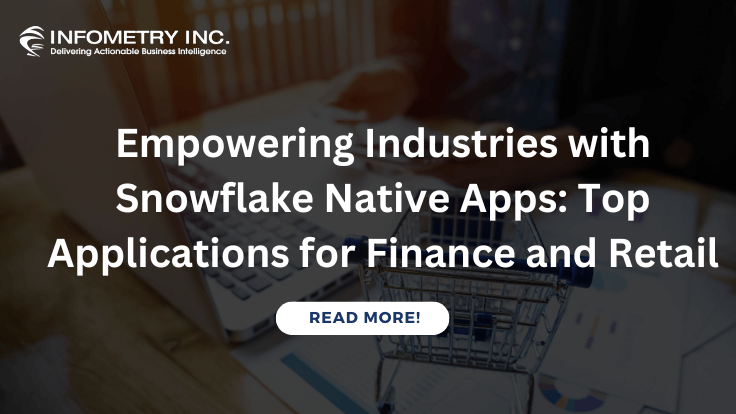
INFOFISCUS Sales & Marketing Analytics: Where Data Meets Decision-Making Excellence
February 14, 2024
Comparing ETL and MDM: Are They Alike or Different?
February 19, 2024In the ever-evolving landscape of data management and analytics, organisations are constantly seeking powerful and efficient solutions to handle their data. Snowflake, a cloud-based data warehousing platform, has emerged as a frontrunner in the field. However, the market is replete with alternatives, each offering its unique features and capabilities. In this blog, we’ll delve into a comprehensive comparison of Snowflake against its competitors to help businesses make an informed decision when choosing the right data cloud solution.
Understanding Snowflake:
Snowflake, founded in 2012, has gained popularity for its cloud-native architecture, scalability, and ease of use. It operates on a multi-cluster, shared data architecture, separating storage and compute resources, allowing for on-demand scaling and cost-effective storage. Snowflake also has its own prebuilt tools such as snowsight, snowpark, etc.
Competitors Overview:
1. Amazon Redshift:
Strengths:
– Native integration with other AWS services.
– Strong performance for complex queries.
– Mature ecosystem with a wide range of tools and services.
Weaknesses:
– Limited scalability compared to Snowflake.
– Requires optimization for mixed workloads.
2. Google BigQuery:
Strengths:
– Serverless architecture, no need for infrastructure management.
– Seamless integration with Google Cloud services.
– Excellent performance on large datasets.
Weaknesses:
– Cost can be higher for small to medium-sized workloads.
– Limited support for machine learning within the platform.
3. Microsoft Azure Synapse Analytics (formerly SQL Data Warehouse):
Strengths:
– Tight integration with the Azure ecosystem.
– Robust security and compliance features.
– Supports both on-demand and provisioned resources.
Weaknesses:
– Steeper learning curve for users unfamiliar with Azure services.
– Complex pricing model.
4. Cloudera Data Warehouse:
Strengths:
– Offers a hybrid cloud deployment option.
– Built on open-source technologies like Apache Impala.
– Integrated with Cloudera’s broader data platform.
Weaknesses:
– Limited scalability compared to some cloud-native solutions.
– May require more hands-on management.
5. IBM Db2 Warehouse on Cloud:
Strengths:
– Integration with other IBM Cloud services.
– Advanced analytics capabilities.
– Good for users already invested in the IBM ecosystem.
Weaknesses:
– May have a steeper learning curve for users unfamiliar with IBM products.
– Limited third-party tool support.
Comparison Criteria:
1. Scalability:
Snowflake excels in scalability with its separate compute and storage resources, allowing organizations to scale both independently. It outperforms competitors like Amazon Redshift and Cloudera Data Warehouse in this aspect.
2. Performance:
Google BigQuery is renowned for its exceptional performance on large datasets, often outshining competitors. Snowflake and Azure Synapse Analytics offer robust performance, with the latter benefiting from tight integration with the Azure ecosystem.
3. Ease of Use:
Snowflake’s user-friendly interface and SQL-based queries make it accessible to users with varying technical backgrounds. Google BigQuery also stands out for its serverless architecture, eliminating the need for infrastructure management.
4. Integration and Ecosystem:
The integration with existing cloud ecosystems is a crucial factor. Amazon Redshift, Azure Synapse Analytics, and Google BigQuery all have strong ties to their respective cloud providers, whereas Snowflake is designed to work across multiple cloud platforms.
5. Security and Compliance:
Azure Synapse Analytics is recognized for its robust security features and compliance capabilities. Snowflake also provides strong security, with features like data sharing and secure data exchange. Cloudera Data Warehouse offers a hybrid cloud deployment option, appealing to organizations with specific compliance requirements.
Infometry Snowflake Data Cloud Solutions: Changing the Data Game
Data has become the lifeblood of modern businesses, and managing it efficiently is crucial for success. Infometry, a leading player in the data management space, has partnered with Snowflake, a cloud-native data warehousing platform, to provide cutting-edge solutions.
Here are the top ways Infometry Snowflake Data Cloud Solutions will change the data game:
1. Scalability Beyond Limits:
Snowflake’s architecture, coupled with Infometry’s expertise, allows organizations to scale their data infrastructure without limits. As data volumes grow, the solution seamlessly adapts, ensuring performance and efficiency.
2. Multi-Cloud Flexibility:
Infometry leverages Snowflake’s cloud-agnostic design, enabling clients to deploy their data solutions across multiple cloud platforms. This flexibility mitigates vendor lock-in concerns and allows businesses to choose the cloud provider that best suits their needs.
3. Unified Data Management:
Infometry’s integration capabilities combined with Snowflake’s data-sharing features create a unified data management platform. Organizations can break down data silos, enabling seamless collaboration across departments and enhancing decision-making processes.
4. Real-Time Analytics:
The Infometry Snowflake solution empowers organizations with real-time analytics capabilities. With Snowflake’s near-zero maintenance and Infometry’s optimization, users can derive insights from their data at unprecedented speeds, gaining a competitive edge in today’s fast-paced business environment.
5. Cost Optimization:
Infometry’s expertise in optimizing data workflows, coupled with Snowflake’s on-demand pricing model, ensures cost-effective data management. Organizations can allocate resources based on actual usage, eliminating the need for overprovisioning and reducing overall operational costs.
6. Advanced Data Security:
Security is paramount in the Infometry Snowflake Data Cloud Solutions. The platform incorporates Snowflake’s robust security features, including encryption, role-based access controls, and data masking. Infometry ensures that data remains secure throughout its lifecycle, addressing compliance requirements and instilling confidence in users.
7. Ease of Use and Rapid Deployment:
Infometry focuses on delivering solutions that are user-friendly and quickly deployable. With Snowflake’s intuitive interface and Infometry’s streamlined implementation processes, organizations can harness the power of advanced data management without lengthy setup times.
8. Machine Learning Integration:
Infometry Snowflake Data Cloud Solutions facilitate the integration of machine learning (ML) into data workflows. This enables organizations to derive predictive insights, automate processes, and stay ahead in the era of AI-driven decision-making.
9. Global Data Sharing:
Snowflake’s data sharing capabilities allow organizations to share live, governed data across regions and with external partners. Infometry ensures that this sharing process is seamless, empowering organizations to collaborate globally and make informed decisions based on the most up-to-date information.
10. Continuous Innovation:
Infometry is committed to staying at the forefront of data management innovation. By harnessing the capabilities of Snowflake, the solution evolves with the latest advancements in cloud technology, ensuring that organizations are well-positioned to tackle future challenges.
Conclusion:
Choosing the right data cloud solution depends on various factors such as scalability requirements, performance expectations, ease of use, and integration with existing systems. Snowflake, with its cloud-agnostic approach, scalability, and user-friendly interface, is a strong contender in the market. However, businesses should carefully evaluate their specific needs and consider factors like cost, ecosystem integration, and compliance before making a decision. Ultimately, the best choice will depend on the unique requirements and priorities of each organization. Moreover, by combining Infometry’s expertise in data management with Snowflake’s powerful cloud-native architecture, organizations can expect a transformative shift in how they handle, analyze, and derive value from their data. This partnership not only addresses current data challenges but also prepares businesses for the dynamic and data-driven future.




